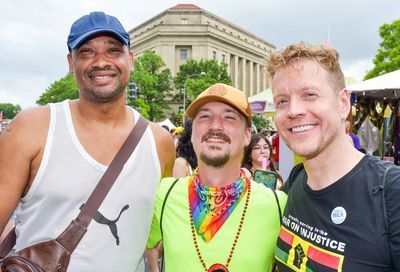U.S. Senate passes resolution condemning anti-LGBTQ violence in Chechnya
Unanimous vote mirrors identical resolution approved by House of Representatives, but White House remains silent

The U.S. Senate has unanimously passed, via voice vote, a resolution condemning the violence and persecution directed against LGBTQ people in Chechnya. The resolution is almost identical to one passed by the U.S. House of Representatives in June.
The bipartisan measure, introduced by Senators Pat Toomey (R-Pa.) and Ed Markey (D-Mass.), calls on Chechen officials to “immediately cease the abduction, detention, and torture of individuals on the basis of their actual or suspected sexual orientation, and hold accountable all those involved in perpetrating such abuses.” It also calls on the U.S. government to continue to speak out forcefully against the anti-LGBTQ purge currently underway in the semi-autonomous Russian republic.
LGBTQ groups praised the Senate’s actions and called upon President Donald Trump and Secretary of State Rex Tillerson to issue public statements condemning the violence.
“With unanimous passage of this resolution, the U.S. Senate just sent a powerful message. Despite the deafening silence from the White House, the people of the United States strongly condemn these anti-LGBTQ attacks in Chechnya,” Ty Cobb, director of HRC Global, said in a statement.
“Members of both parties in both chambers have now condemned the anti-LGBTQ Chechen violence and persecution, and it’s far past time that President Trump and Secretary Tillerson also publicly do so,” Cobb added. “Given the growing violence and arrests of LGBTQ people around the world, the United States must not back away from leading on LGBTQ human rights.”
“The President must follow the leadership of the United States Senate and demand an immediate end to the arrest and abuse of LGBTQ people in Chechnya,” Sarah Kate Ellis, the president and CEO of GLAAD, said in a statement. “Global leaders have condemned this humanitarian crisis and the growing epidemic of anti-LGBTQ violence around the world, and we cannot stand for a White House that watches these human rights abuses in silence.”
Both Trump and Tillerson have failed to speak publicly about the ongoing crisis in Chechnya, though the State Department did offer a brief statement condemning the reports of anti-LGBTQ persecution. In September, The Washington Post quoted a State Department official who claimed Tillerson had written a letter to Russian Foreign Minister Sergei Lavrov about the detentions and killings. But the letter was never released to the public, prompting HRC to file a Freedom of Information Act request asking the State Department to provide all records regarding that letter and its contents.
The purge in Chechnya started early this year, when Chechen authorities began rounding up, detaining, and interrogating — and in some cases, even torturing — more than 100 men in secret facilities because they were suspected of being gay or bisexual. The Russian newspaper Novaya Gazeta has reported the names of at least 27 men who are suspected to have been killed in the purge, and the number of fatalities may be as high as 56.
Additionally, human rights advocates have noted that Chechen security forces have encouraged families of men who were rounded up to murder their relatives in “honor killings.” Still other accounts claim that authorities will label suspected LGBTQ people as “terrorists” and share their names with law enforcement in order to maintain surveillance on them and prevent them from escaping the region.
Both Chechen leader Ramzan Kadyrov, an ally of Russian President Vladimir Putin, and officials with the Kremlin have denied that any such persecution has been occurring, with Kadyrov even going so far as to deny the existence of gays in the republic altogether.
For months, Russian officials have argued that reports of such detentions and violence were simply speculative, as they had received no official complaints of abuse. Two weeks ago, Maxim Lapunov, a 30-year-old ethnic Russian living in Chechnya, filed a complaint and went public with his story.
Lapunov claims he was detained for 12 days in a makeshift jail cell, led around with a plastic bag with a small hole for breathing over his head, and beaten by police officers, who demanded that he confess to being gay. Lapunov’s complaint remains the only one currently on file with the Russian government, as many ethnic Chechens are inclined not to report their abuse, for fear of retaliation by family members.
Support Metro Weekly’s Journalism
These are challenging times for news organizations. And yet it’s crucial we stay active and provide vital resources and information to both our local readers and the world. So won’t you please take a moment and consider supporting Metro Weekly with a membership? For as little as $5 a month, you can help ensure Metro Weekly magazine and MetroWeekly.com remain free, viable resources as we provide the best, most diverse, culturally-resonant LGBTQ coverage in both the D.C. region and around the world. Memberships come with exclusive perks and discounts, your own personal digital delivery of each week’s magazine (and an archive), access to our Member's Lounge when it launches this fall, and exclusive members-only items like Metro Weekly Membership Mugs and Tote Bags! Check out all our membership levels here and please join us today!






























You must be logged in to post a comment.